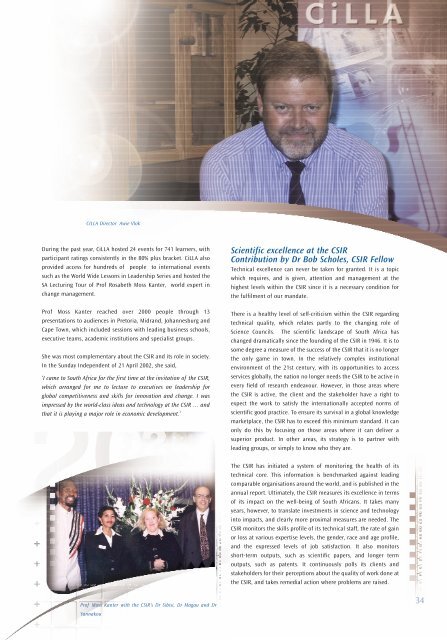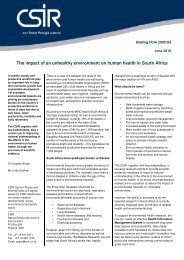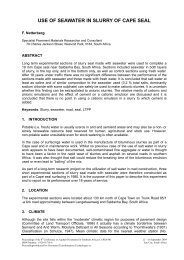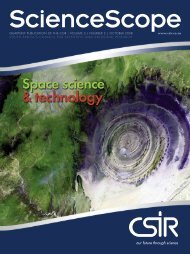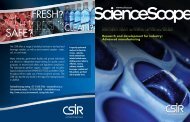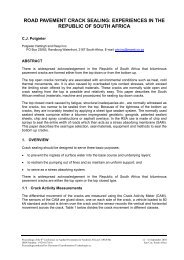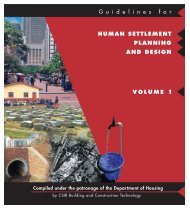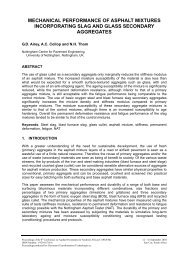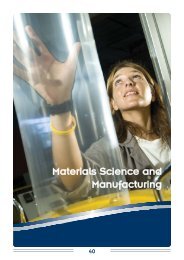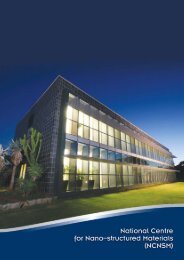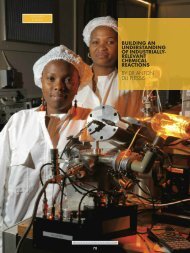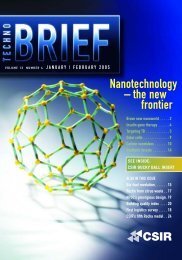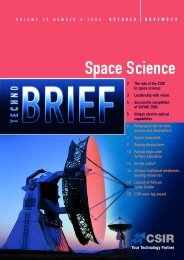CSIR Technology Impact 2002
CSIR Technology Impact 2002
CSIR Technology Impact 2002
You also want an ePaper? Increase the reach of your titles
YUMPU automatically turns print PDFs into web optimized ePapers that Google loves.
CILLA Director Awie Vlok<br />
During the past year, CiLLA hosted 24 events for 741 learners, with<br />
participant ratings consistently in the 80% plus bracket. CiLLA also<br />
provided access for hundreds of people to international events<br />
such as the World Wide Lessons in Leadership Series and hosted the<br />
SA Lecturing Tour of Prof Rosabeth Moss Kanter, world expert in<br />
change management.<br />
Prof Moss Kanter reached over 2000 people through 13<br />
presentations to audiences in Pretoria, Midrand, Johannesburg and<br />
Cape Town, which included sessions with leading business schools,<br />
executive teams, academic institutions and specialist groups.<br />
She was most complementary about the <strong>CSIR</strong> and its role in society.<br />
In the Sunday Independent of 21 April <strong>2002</strong>, she said,<br />
‘I came to South Africa for the first time at the invitation of the <strong>CSIR</strong>,<br />
which arranged for me to lecture to executives on leadership for<br />
global competitiveness and skills for innovation and change. I was<br />
impressed by the world-class ideas and technology at the <strong>CSIR</strong> … and<br />
that it is playing a major role in economic development.’<br />
Prof Moss Kanter with the <strong>CSIR</strong>’s Dr Sibisi, Dr Magau and Dr<br />
Yannakou<br />
Scientific excellence at the <strong>CSIR</strong><br />
Contribution by Dr Bob Scholes, <strong>CSIR</strong> Fellow<br />
Technical excellence can never be taken for granted. It is a topic<br />
which requires, and is given, attention and management at the<br />
highest levels within the <strong>CSIR</strong> since it is a necessary condition for<br />
the fulfilment of our mandate.<br />
There is a healthy level of self-criticism within the <strong>CSIR</strong> regarding<br />
technical quality, which relates partly to the changing role of<br />
Science Councils. The scientific landscape of South Africa has<br />
changed dramatically since the founding of the <strong>CSIR</strong> in 1946. It is to<br />
some degree a measure of the success of the <strong>CSIR</strong> that it is no longer<br />
the only game in town. In the relatively complex institutional<br />
environment of the 21st century, with its opportunities to access<br />
services globally, the nation no longer needs the <strong>CSIR</strong> to be active in<br />
every field of research endeavour. However, in those areas where<br />
the <strong>CSIR</strong> is active, the client and the stakeholder have a right to<br />
expect the work to satisfy the internationally accepted norms of<br />
scientific good practice. To ensure its survival in a global knowledge<br />
marketplace, the <strong>CSIR</strong> has to exceed this minimum standard. It can<br />
only do this by focusing on those areas where it can deliver a<br />
superior product. In other areas, its strategy is to partner with<br />
leading groups, or simply to know who they are.<br />
The <strong>CSIR</strong> has initiated a system of monitoring the health of its<br />
technical core. This information is benchmarked against leading<br />
comparable organisations around the world, and is published in the<br />
annual report. Ultimately, the <strong>CSIR</strong> measures its excellence in terms<br />
of its impact on the well-being of South Africans. It takes many<br />
years, however, to translate investments in science and technology<br />
into impacts, and clearly more proximal measures are needed. The<br />
<strong>CSIR</strong> monitors the skills profile of its technical staff, the rate of gain<br />
or loss at various expertise levels, the gender, race and age profile,<br />
and the expressed levels of job satisfaction. It also monitors<br />
short-term outputs, such as scientific papers, and longer term<br />
outputs, such as patents. It continuously polls its clients and<br />
stakeholders for their perceptions about the quality of work done at<br />
the <strong>CSIR</strong>, and takes remedial action where problems are raised.<br />
34


